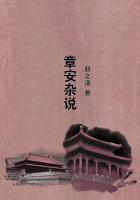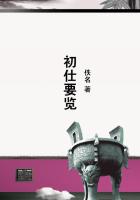Monckton Milnes was a social power in London, possibly greater than Londoners themselves quite understood, for in London society as elsewhere, the dull and the ignorant made a large majority, and dull men always laughed at Monckton Milnes. Every bore was used to talk familiarly about "****y Milnes," the "cool of the evening"; and of course he himself affected social eccentricity, challenging ridicule with the indifference of one who knew himself to be the first wit in London, and a maker of men -- of a great many men. A word from him went far. An invitation to his breakfast-table went farther. Behind his almost Falstaffian mask and laugh of Silenus, he carried a fine, broad, and high intelligence which no one questioned. As a young man he had written verses, which some readers thought poetry, and which were certainly not altogether prose. Later, in Parliament he made speeches, chiefly criticised as too good for the place and too high for the audience. Socially, he was one of two or three men who went everywhere, knew everybody, talked of everything, and had the ear of Ministers; but unlike most wits, he held a social position of his own that ended in a peerage, and he had a house in Upper Brook Street to which most clever people were exceedingly glad of admission. His breakfasts were famous, and no one liked to decline his invitations, for it was more dangerous to show timidity than to risk a fray. He was a voracious reader, a strong critic, an art connoisseur in certain directions, a collector of books, but above all he was a man of the world by profession, and loved the contacts -- perhaps the collisions -- of society. Not even Henry Brougham dared do the things he did, yet Brougham defied rebuff. Milnes was the good-nature of London; the Gargantuan type of its refinement and coarseness; the most universal figure of May Fair.
Compared with him, figures like Hayward, or Delane, or Venables, or Henry Reeve were quite secondary, but William E. Forster stood in a different class. Forster had nothing whatever to do with May Fair. Except in being a Yorkshireman he was quite the opposite of Milnes. He had at that time no social or political position; he never had a vestige of Milnes's wit or variety; he was a tall, rough, ungainly figure, affecting the singular form of self-defense which the Yorkshiremen and Lancashiremen seem to hold dear -- the exterior roughness assumed to cover an internal, emotional, almost sentimental nature. Kindly he had to be, if only by his inheritance from a Quaker ancestry, but he was a Friend one degree removed. Sentimental and emotional he must have been, or he could never have persuaded a daughter of Dr. Arnold to marry him. Pure gold, without a trace of base metal; honest, unselfish, practical; he took up the Union cause and made himself its champion, as a true Yorkshireman was sure to do, partly because of his Quaker anti-slavery convictions, and partly because it gave him a practical opening in the House. As a new member, he needed a field.
Diffidence was not one of Forster's weaknesses. His practical sense and his personal energy soon established him in leadership, and made him a powerful champion, not so much for ornament as for work. With such a manager, the friends of the Union in England began to take heart. Minister Adams had only to look on as his true champions, the heavy-weights, came into action, and even the private secretary caught now and then a stray gleam of encouragement as he saw the ring begin to clear for these burly Yorkshiremen to stand up in a prize-fight likely to be as brutal as ever England had known. Milnes and Forster were not exactly light-weights, but Bright and Cobden were the hardest hitters in England, and with them for champions the Minister could tackle even Lord Palmerston without much fear of foul play.
In society John Bright and Richard Cobden were never seen, and even in Parliament they had no large following. They were classed as enemies of order, -- anarchists, -- and anarchists they were if hatred of the so-called established orders made them so. About them was no sort of political timidity.
They took bluntly the side of the Union against Palmerston whom they hated.
Strangers to London society, they were at home in the American Legation, delightful dinner-company, talking always with reckless *******. Cobden was the milder and more persuasive; Bright was the more dangerous to approach; but the private secretary delighted in both, and nourished an ardent wish to see them talk the same language to Lord John Russell from the gangway of the House.
With four such allies as these, Minister Adams stood no longer quite helpless. For the second time the British Ministry felt a little ashamed of itself after the Trent Affair, as well it might, and disposed to wait before moving again. Little by little, friends gathered about the Legation who were no fair-weather companions. The old anti-slavery, Exeter Hall, Shaftesbury clique turned out to be an annoying and troublesome enemy, but the Duke of Argyll was one of the most valuable friends the Minister found, both politically and socially, and the Duchess was as true as her mother. Even the private secretary shared faintly in the social profit of this relation, and never forgot dining one night at the Lodge, and finding himself after dinner engaged in instructing John Stuart Mill about the peculiar merits of an American protective system. In spite of all the probabilities, he convinced himself that it was not the Duke's claret which led him to this singular form of loquacity; he insisted that it was the fault of Mr. Mill himself who led him on by assenting to his point of view. Mr. Mill took no apparent pleasure in dispute, and in that respect the Duke would perhaps have done better; but the secretary had to admit that though at other periods of life he was sufficiently and even amply snubbed by Englishmen, he could never recall a single occasion during this trying year, when he had to complain of rudeness.
Friendliness he found here and there, but chiefly among his elders; not among fashionable or socially powerful people, either men or women; although not even this rule was quite exact, for Frederick Cavendish's kindness and intimate relations made Devonshire House almost familiar, and Lyulph Stanley's ardent Americanism created a certain cordiality with the Stanleys of Alderley whose house was one of the most frequented in London. Lorne, too, the future Argyll, was always a friend. Yet the regular course of society led to more literary intimacies. Sir Charles Trevelyan's house was one of the first to which young Adams was asked, and with which his friendly relations never ceased for near half a century, and then only when death stopped them. Sir Charles and Lady Lyell were intimates. Tom Hughes came into close alliance. By the time society began to reopen its doors after the death of the Prince Consort, even the private secretary occasionally saw a face he knew, although he made no more effort of any kind, but silently waited the end. Whatever might be the advantages of social relations to his father and mother, to him the whole business of diplomacy and society was futile. He meant to go home.















